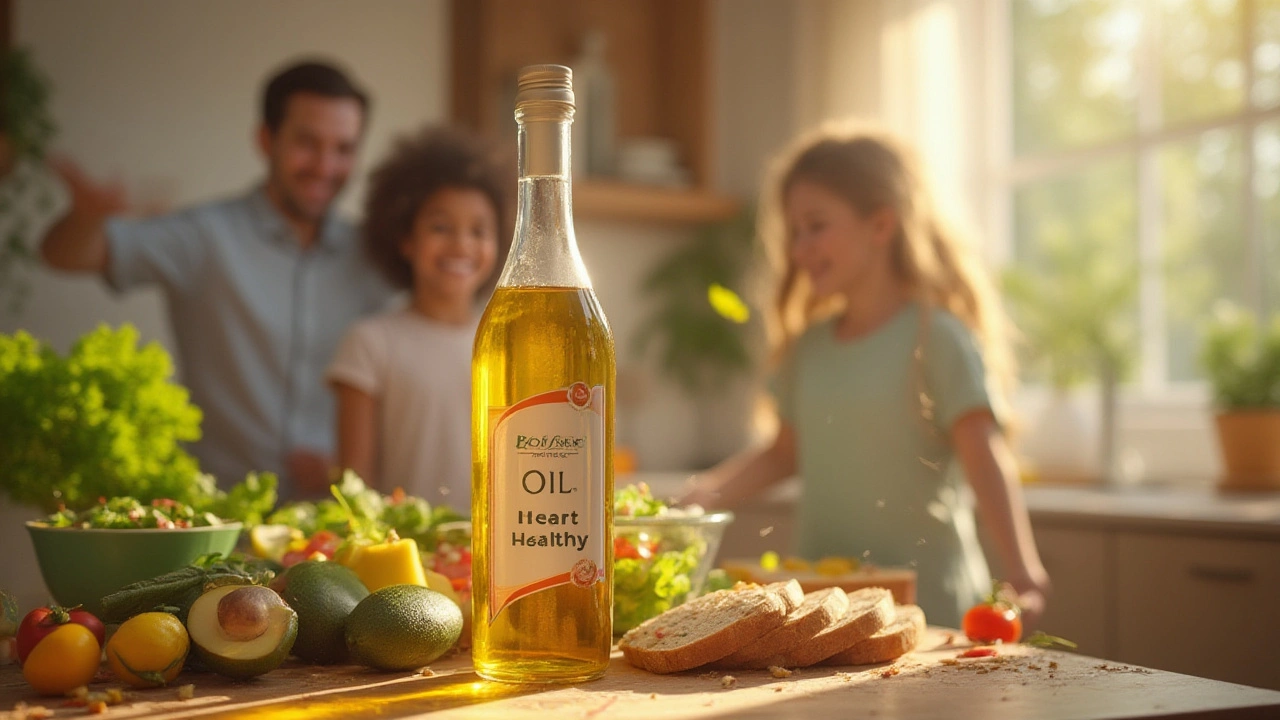Soybean Oil Benefits: A Natural Supplement for Healthier Living
 Jun, 30 2025
Jun, 30 2025
If you looked inside most kitchens, you'd probably find a big bottle of pale yellow soybean oil squeezed somewhere on a shelf. Most people don’t give it much thought—it’s the stuff for sautéing veggies or tossing with a salad. But here’s the wild fact: soybean oil is loaded with nutrients your body quietly craves. From heart-healthy fats to vitamins that keep you sharp, its power goes way beyond cooking. No shock that, as of 2025, soybean oil is the most widely consumed vegetable oil on the planet.
Let’s unpack exactly what makes this versatile oil a surprisingly valuable natural dietary supplement, and how you can harness those perks the smart way.
Soybean Oil: The Nutritional Lowdown
Crack open the label on that bottle and it’s got a Cinderella story. Soybean oil, squeezed from pressed soybeans, is packed with polyunsaturated and monounsaturated fats. You know how you hear about “good fats” that your body loves? This oil is swimming in them, including linoleic acid (an omega-6 fatty acid) and alpha-linolenic acid (an omega-3). These essential fatty acids aren’t just buzzwords—they help maintain cell membranes, support vision, and play a key role in brain function.
Let’s get into the numbers—just one tablespoon offers roughly:
| Nutrient | Amount per Tbsp |
|---|---|
| Calories | 120 |
| Total Fat | 14g |
| Saturated Fat | 2g |
| Polyunsaturated Fat | 8g |
| Monounsaturated Fat | 3g |
| Omega-6 fatty acids | 7g |
| Omega-3 fatty acids | 0.9g |
| Vitamin E | 1.1mg (about 7% daily value) |
But it’s more than just fats. Vitamin E, found in every spoonful, works as a powerful antioxidant. It shields cells from damage and supports everything from glowing skin to a sharp mind. This is the stuff of age-defying serums, right in your kitchen.
Here’s a quirky tidbit: people who eat balanced levels of polyunsaturated fats instead of saturated fats have been shown to slash their risk of heart disease by up to 30%. That’s about the same drop as you’d get from quitting a smoking habit—let that sink in for a second.
Soybean oil is also cholesterol-free. The American Heart Association backs diets higher in polyunsaturated and monounsaturated fats, found in soybean oil, for better cardiovascular health. But don’t let all the excitement push you to drink the stuff—balance is still the secret sauce.
Keep in mind, cold-pressed or minimally processed soybean oil has a higher nutrient score compared to highly refined types. Some of the value vanishes in the heavy processing that’s common for the mass-market oils. If you’re focused on using this oil as a dietary supplement, you’ll want to seek out the less-refined versions at a health food store.

How Soybean Oil Supports Your Body
This isn’t another oil that just adds calories to your day. There’s a reason dietitians love its fat profile—those essential fats actually fuel your body on a cellular level. Your brain, for one, is made up of about 60% fat. Omega-3 and omega-6 fatty acids work like gym trainers for your neurons, keeping them flexible and firing signals fast, so you stay sharp whether you’re busting out spreadsheets or wrangling kids at the park.
Cardiovascular support stands out as another big claim to fame. There’s a legit body of research from Harvard, published in 2023, finding people swapping saturated fats (think lard, butter) for polyunsaturated-rich oils like soybean lowered total cholesterol by up to 10%. That’s a decent drop with a simple kitchen switch.
The anti-inflammatory benefits come into play too. Chronic inflammation is linked to nearly everything from joint aches to autoimmune problems. Soybean oil’s alpha-linolenic acid can cool this inflammation, just like fish oil does, but without any fishy aftertaste. If you’re plant-based or vegan, this is a big win.
Here’s something unexpected—soybean oil helps your skin from the inside. Vitamin E and essential fats work together to give that just-moisturized look. Got dry patches or dullness? Adding a little soybean oil to your daily routine (in your salad, a smoothie, or even a drizzle over steamed veggies) could help balance things out. No need to buy extra pills or fancy creams.
On the digestion front, soybean oil is very easy on the stomach. It’s rarely a trigger for allergies and it tends to stay stable at high cooking temperatures, making it a top pick for anything from stir-fries to homemade dressings. If you watch what foods mess with your gut, this makes a reliable “safe fat.”
If you’re concerned about hormone health, especially as you age, those fatty acids play a supportive role here, too. Hormones—like estrogen and testosterone—need healthy fats for production and balance. People with low fat in their diets can sometimes experience wonky hormone swings, lower energy, and even mood changes. Whipping up a tofu stir-fry with a splash of soybean oil doesn’t just taste good—it could keep your mood steadier, too.
The plant sterols in the oil also block some cholesterol absorption. Each tablespoon gives a modest dose of phytosterols, compounds that act like bouncers at a club, keeping unwanted cholesterol from getting into your bloodstream. It’s this little extra perk that helps explain why people using more plant-based oils often have better cholesterol numbers without much effort.
Pro-tip: soybean oil is super versatile. Blend it into smoothies, whisk it with lemon for a quick salad sauce, or use it in place of butter when baking. Its mild flavor won’t overpower dishes. But if you want the most nutrients, don’t crank up the heat—it loses some antioxidant power at very high temps.

Tips for Choosing, Using, and Supplementing Soybean Oil
Not all bottles are created equal, so start with picking the right kind. Look for labels like “cold-pressed,” “unrefined,” or “organic” if you want maximum nutrition. These usually have richer color and a slightly nutty or beany aroma—signs you’re getting more natural goodness. Refined versions are more neutral and usually cheaper, but a bit less nutritious.
How much should you actually use? Most nutritionists recommend around two to four tablespoons daily of healthy oils, but you don’t want to get all your fats from one source. That’s like eating only broccoli for veggies—good at first, but boring and limiting. Mix up your sources: olive oil, flaxseed oil, and soybean oil each have unique profiles that “fill in” each other’s nutritional gaps.
If you’re using soybean oil as a dietary supplement, here’s a quick list to fold into your meals without drowning your food in fat:
- Drizzle one tablespoon over roasted sweet potatoes or steamed broccoli.
- Blend into homemade hummus for a creamy texture.
- Stir a spoonful into oatmeal or mashed avocado toast.
- Swap for mayo in egg salads or sandwich spreads.
- Try as the base for quick vinaigrettes with your favorite vinegar and a pinch of herbs.
Just remember, soybean oil is calorie-dense. Even healthy fats add up—so be mindful with measuring spoons instead of eyeballing. People trying to shed pounds or control cholesterol need to balance total fat intake while keeping those healthy sources on the menu.
If you want to go beyond food and use soybean oil directly on your skin or hair, it’s good for softening and soothing. But always patch-test to check for any irritation, especially if you have really sensitive skin.
Watch out for processed foods listing “hydrogenated soybean oil” as an ingredient. That’s usually trans fats, which are an unhealthy byproduct and should be avoided. Stick to minimally processed pure soybean oil. As of 2025, U.S. manufacturers are required by law to list trans fat content clearly, so labels are your new best friend.
For people with soy allergies, obviously, this isn’t the oil for you. While highly refined soybean oil removes most allergenic proteins, some folks are still sensitive, so talk with your healthcare provider if you’re unsure.
Feeling inspired to give this oil a second look? The science backing soybean oil’s benefits just keeps getting stronger, and it fits easily into just about any diet—vegan, keto, or the classic Mediterranean approach. Keep a good bottle on hand, and you’ve always got a kitchen shortcut to better nutrition, strong skin, and a heart that beats a little happier.
Richard Elias
July 10, 2025 AT 15:12Scott McKenzie
July 11, 2025 AT 09:21Jeremy Mattocks
July 12, 2025 AT 17:04Paul Baker
July 14, 2025 AT 01:30Zack Harmon
July 14, 2025 AT 18:07Jeremy S.
July 16, 2025 AT 02:25Jill Ann Hays
July 16, 2025 AT 18:07Mike Rothschild
July 17, 2025 AT 18:40Ron Prince
July 18, 2025 AT 02:38Sarah McCabe
July 18, 2025 AT 17:29King Splinter
July 20, 2025 AT 03:13